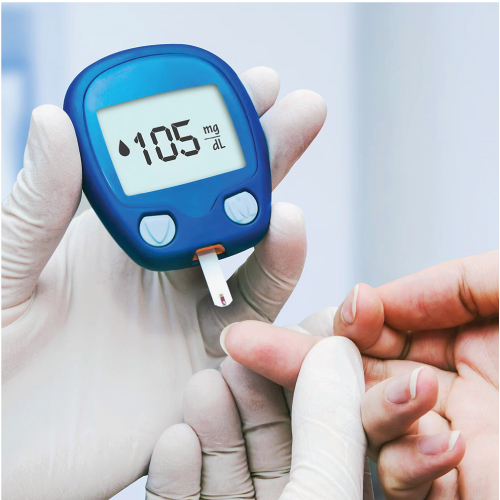The three words, “You have diabetes”, usually have a profound effect on the individual, young or old,
Globally, an estimated 422 million adults are living with Diabetes Mellitus. Diabetes Mellitus occurs throughout the world, due to urbanization and lifestyle changes, sedentary lifestyles, less physically demanding work and increased intake of foods that are high energy-dense but nutrient-poor (often high in sugar and saturated fats
Today India is turning to be the Diabetes capital of world with as many as 65 million people with type 2 Diabetes mellitus. So prevention of diabetes means changing a culture where inactivity, obesity and poor eating habits run rampant.
Diabetes self-care management is necessary in order to maintain blood sugars and prevent complications.
According to WHO,
‘Diabetes mellitus is a chronic disease caused by inherited and/or acquired deficiency in production of insulin by the pancreas, or by the ineffectiveness of the insulin produced. Such a deficiency results in increased concentrations of glucose in the blood, which in turn damage many of the body’s systems, in particular the blood vessels and nerves.’
[/vc_column_text][vc_empty_space][vc_empty_space][vc_row_inner][vc_column_inner][vc_column_text]Risk Factors For Diabetes:
The causes of diabetes vary depending on the individual and the type. Family history is a known risk factor for type 1 diabetes.Risk factors for type 2 diabetes and pre-diabetes are many. The following can raise your risk of developing type 2 diabetes:
- Being obese or overweight
- High blood pressure
- Elevated levels of triglycerides and low levels of “good” cholesterol (HDL)
- Sedentary lifestyle
- Family history
- Increasing age
- Polycystic ovary syndrome
- Impaired glucose tolerance
- Insulin resistance
- Gestational diabetes during a pregnancy
- Ethnic background
Early signs and symptoms of diabetes.
Symptoms of Diabetes:
- Frequent urination.
- Excessive thirst.
- Increased hunger.
- Weight loss.
- Tiredness
- Blurred vision.
- Frequent infections and slow-healing wounds.
Extremely elevated glucose levels can lead to lethargy and coma.
[/vc_column_text][vc_empty_space][/vc_column_inner][/vc_row_inner][vc_row_inner][vc_column_inner][vc_column_text]Chronic complications of diabetes
These diabetes complications involving the eyes (diabetic retinopathy), kidneys (diabetic nephropathy) and nerves (diabetic neuropathy) ,heart and blood vessels. Diabetes accelerates hardening of the arteries (atherosclerosis) leading to coronary heart disease ,strokes, and pain in the lower extremities
How do I Know I Have Diabetes
Many people are unaware that they have diabetes, especially in its early stages when symptoms
may not be present. There is no definite way to know if you have diabetes without undergoing blood tests to determine your blood glucose levels. See your doctor if you have symptoms of diabetes or if you are concerned about your diabetes risk.
How it is diagnosed
- The fasting blood glucose (sugar) test
- A random blood glucose test.
- The oral Glucose tolerance test
- Haemoglobin A1c
Ayurvedic Ways to Cure Diabetes:
In Ayurveda, Diabetes Madhu meha (Diabetes mellitus) is managed by medicines,Panchakarma,diet,Yoga and physical exercise. Ancient text describes 20 types of prameha, out of these 10 are due to kapha , 6 are due to pitta , 4 are due to vata . Diabetes is considered as major disease because if not treated in time, it can lead to several complications like diabetic neuropathy, diabetic retinopathy, kidney disorders like acute or chronic kidney failure, urological problems and many more.
Ayurvedic treatment and proper diet and lifestyle modifications can help us to avoid these kinds of complications and offer to live along as well as healthy life for society.
Ayurvedic Bio- detoxification therapy ( Panchakarma treatments) like Vamana, Virechana along with external treatments like Takradhara , Padaabhyanaga,langhana (fasting) therapies based upon individual specification, disease specification,and other parameters.
Along with the suitable treatment advised, the Doctor plans a diabetic diet for the patient depending on his/her body constitution and Diabetes status.
[/vc_column_text][vc_empty_space][/vc_column_inner][/vc_row_inner][vc_column_text]Do’s and Dont’s in Diabetic Management- Choose whole grains and whole grain products over highly processed carbohydrates.
- Skip the sugary drinks, and choose water, coffee, or tea instead (with no sugar).
- Choose good fats instead of bad fats.
- Limit red meat and avoid processed meat; choose nuts, whole grains, poultry, or fish instead.
- Eat dry fruits, but in very less quantity.
- Work out every day.
- Practice Yoga and Meditation to reduce stress.
- Quit smoking.
- Reduce alcohol consumption.
- Consult your doctor to know your ideal weight and work towards achieving it.
- Consult concern specialist if you have diabetic complications.
- Diet management
From Shathayu you will be provided
- Excellent consultation and proper guidance in diabetes management.
- Clarification of all your queries regarding health
- Authentic Panchakarma treatments.
- Diet management
- Excellent nursing and supporting staffs.
- A happy and peaceful treatment period.

